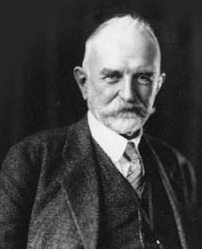George Herbert Mead
Appearance

George Herbert Mead (February 27, 1863 – April 26, 1931) was an American philosopher, sociologist and psychologist, primarily affiliated with the University of Chicago, where he was one of several distinguished pragmatists. He is regarded as one of the founders of social psychology and of what has come to be referred to as the Chicago sociological tradition.
| This article about a sociologist is a stub. You can help out with Wikiquote by expanding it! |
Quotes
[edit]- Man lives in a world of Meaning. What he sees and hears means what he will or might handle.
- George Herbert Mead (1926). "The Nature of Aesthetic Experience." International Journal of Ethics, Vol. 36, No. 4 (Jul., 1926), pp. 382-393; p. 382
- The proximate goal of all perception is what we can get our hands upon. If we traverse the distance that separate us from that which we see or hear and find nothing for the hand to manipulate, the experience is an illusion or a hallucination. The world of perceptual reality, the world of physical things, is the world of our contacts and our manipulations, and the distance experience of the eye and the ear means first of all these physical things. Physical things are not only the meaning of what we see and hear; they are also the means we employ to accomplish our ends.
- George Herbert Mead (1926). "The Nature of Aesthetic Experience." International Journal of Ethics, Vol. 36, No. 4 (Jul., 1926), pp. 382-393; p. 382
- Physical things are perceptual things. They also arise within the act... It is in the operation with these perceptual or physical things which lie within the physiological act short of consummation that the peculiar human intelligence is found.
- George Herbert Mead (1927;314), as cited in: Marcus Persson (2007), Mellan människor och ting. En interaktionistisk analys av samlandet, p. 19
Mind, Self, and Society. 1934
[edit]George Herbert Mead and Charles W. Morris ed. (1934). Mind, Self, and Society. University of Chicago Press
- Social psychology has, as a rule, dealt with various phases of social experience from the psychological standpoint of individual experience. The point of approach which I wish to suggest is that of dealing with experience from the standpoint of society, at least from the standpoint of communication as essential to the social order. Social psychology, on this view, presupposes an approach to experience from the standpoint of the individual, but undertakes to determine in particular that which belongs to this experience because the individual himself belongs to a social structure, a social order.
- p. 1 , lead paragraph
- Social psychology is especially interested in the effect which the social group has in the determination of the experience and conduct of the individual member.
- p. 1
The Philosophy of the Act, 1938
[edit]George Herbert Mead & . The Philosophy of the Act. Charles W. Morris with John M. Brewster, Albert M. Dunham and David Miller (eds.) Chicago: University of Chicago, 1938.
- There is, of course, the critical difference between the pressure of hands against each other, and that of the stone against the hand: that in the case of the pressure of the hands against each other there is the sense of effort in each hand, while in the case of the stone there is only the sense of resistance in the stone against the pressing hand. However, the resistance remains an identical content of the two. Furthermore, the resistance of the hand arises only over against that of the stone. The stone defines the hand as necessarily as the hand the hand. It is a fundamental experience in which each object involves the other. It is that from which geometrical congruence is abstracted. Each surface, that of the hand and that of the stone, is given as immediately as the other, and the resistance of the one is given as immediately as that of the other. The abstraction of it in physical science is inertia. Out of the experience arise the physical thing and the organism. Neither is prior.
- p. 187. Essay 13. "Perception and the Spatiotemporal"
Quotes about George Herbert Mead
[edit]- [George Herbert Mead] approach completely changes the meaning of intentionality, inasmuch as here action is no longer understood as the realization of ends set beforehand, in contrast to the theories of rational action and their transformation in the sociological theory of action. For the pragmatists, the setting of ends is not an act of consciousness that takes place outside of contexts of action.
- Hans Joas, "The Creativity of Action and the Intersubjectivity of Reason: Mead's Pragmatism and Social Theory." Transactions of the Charles S. Peirce Society 26.2 (1990): 165-194: As cited in: Persson (2007:35)
- Sociologists such as George Herbert Mead and Charles Horton Cooley thought of society as a human laboratory where they could observe and understand human behavior to be better able to address human needs, and they used the city in which they lived as a living laboratory.
- Margaret L. Andersen, Howard F. Taylor (2016), Sociology: The Essentials. p. 17

